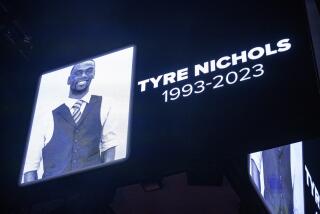Nichols Jury Begins Deliberating; Defense Warns of ‘Tide of Anger’
- Share via
DENVER — With both prosecutors and defense lawyers cautioning panelists against a decision based on emotion, a jury began deciding Monday whether Terry Lynn Nichols should live or die for his part in planning the Oklahoma City bombing.
“I feel as though I’m standing before you and trying to sweep back a tide of anger and grief and vengeance,” said lead defense attorney Michael Tigar in arguing that Nichols should receive a relatively light sentence--neither death nor life in prison.
He urged the jurors not to act on a desire for revenge in the blast that killed 168 people, the worst mass murder in U.S. history.
But Pat Ryan, the U.S. attorney in Oklahoma City, suggested that death by lethal injection is the appropriate sentence in the case.
“Terry Nichols is a product of his own choices,” Ryan reminded the jurors. “Now it’s time. It’s time for Terry Nichols to accept responsibility for his actions.”
And assistant prosecutor Beth Wilkinson told the jury the death sentence “is a just and reasoned response of the moral conscience of our community” to the bombing.
“Terry Nichols conspired to do something that can only be described as evil,” she said. “It will be in the hearts of all Americans for many years to come.”
The jury of seven women and five men deliberated for nearly five hours Monday before retiring for the night. Their deliberations will continue today.
Their options are death or life in prison with no release. Or, as Tigar urged, they could let U.S. District Judge Richard P. Matsch impose the sentence, ranging from life without release to a fixed number of years.
The panel reached a split verdict two weeks ago, finding Nichols guilty of conspiring with Timothy J. McVeigh to plan the bombing, but acquitting him of actually detonating the truck bomb and destroying the Alfred P. Murrah Federal Building.
The jurors also found him not guilty of first- and second-degree murder in the deaths of the eight federal law enforcement officers killed in the April 19, 1995, blast, and convicted him instead of the lesser charge of involuntary manslaughter.
In contrast, a separate jury in Denver found McVeigh guilty earlier this year of all the counts against him--including the eight first-degree murder charges--and sentenced him to death.
Nichols, 42, and McVeigh, 29, served together in the Army and, in the years after their service, developed a hatred for the federal government. Their anger was galvanized by the government’s 1993 assault on a religious cult’s compound in Waco, Texas, which left more than 80 people dead.
During the sentencing phase of Nichols’ trial, prosecutors sought to show through the testimony of a fellow soldier that he was a mentor to McVeigh--a suggestion that Nichols had the lead role in the conspiracy.
The government’s evidence in his trial showed that Nichols assisted McVeigh in purchasing ammonium nitrate and fuel oil, as well as in renting storage lockers and mixing the bomb.
But Nichols was at home in Herington, Kan., on the morning of the bombing, and Tigar tried again Monday--as he had during the guilt phase of the trial--to imply that McVeigh was helped by others in carrying out the crime. He suggested, for instance, that someone “reserved” McVeigh’s parking spot for the truck in front of the Murrah building.
He specifically mentioned Michael Fortier as a possible accomplice. Fortier, whose friendship with Nichols and McVeigh began in the Army, became the chief prosecution witness against them in return for a reduced sentence on charges related to the bombing.
In his closing argument during the trial’s guilt phase, Tigar had stood behind Nichols, placed his hand on his shoulder and referred to him as “my brother.”
On Monday, he recalled how the prosecutors tried to use that phrase to their advantage by pointing out how many brothers--and sisters--were killed in the blast.
Tigar explained that he took the phrase from the Old Testament story of Joseph in the Bible, in which Joseph is sold into slavery by his brothers only to become a chief judicial advisor to the Pharoah in Egypt. Joseph later is asked to render judgment for his own brothers.
“He could understand that this is a human process, and that what we all share looks to the future and not to the past,” Tigar said.
“We ask you, we suggest to you, this case should go back to Judge Matsch” for the determination of Nichols’ sentence.
Tigar then pointed to Nichols and told the jury, “My brother is in your hands.”
Ryan told the jurors he recognized that it would “be tempting to refer the matter for sentencing to Matsch.” But, he added, “A sentence of less than life would be an unconscionable result. It would be simply unconscionable.”
He also said: “It is your responsibility to write the final chapter in the history of the Oklahoma City bombing. And that chapter should record that history reflects that justice was done in this trial.”
Wilkinson stressed that there is no way Nichols could not have known of the devastation that would result from the bombing that he helped plot.
She held up pictures of Royia Sims, a young woman so badly injured in the blast that at first ambulance workers almost began “tagging her for dead.” Instead she survived--barely.
The jury saw two pictures of Sims--one before the bombing, a studio portrait of a beautiful lady, the second depicting her face cut, bruised and badly broken as a result of the blast.
“How can you tell Royia Sims,” Wilkinson asked, “that [Nichols] had no idea that placing a weapon of mass destruction in front of the Alfred P. Murrah Federal Building would make her go from this to this?”
More to Read
Sign up for Essential California
The most important California stories and recommendations in your inbox every morning.
You may occasionally receive promotional content from the Los Angeles Times.














